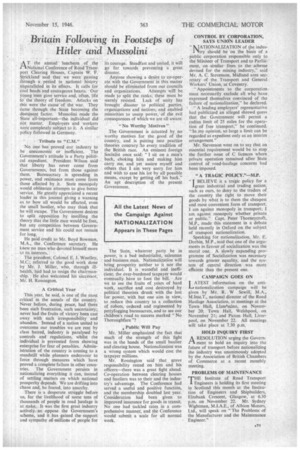Britain Following in Footsteps of Hitler arid Mussolini A T the
Page 23

If you've noticed an error in this article please click here to report it so we can fix it.
annual luncheon of the National Conference of Road Transport Clearing Houses, Captain W. F. Strickland said that we were passing throngh a period in national • .history unparalleled in its effects. It calls (or cool heads and courageous hearts. Our young Men gave service and, often, life td the theory of freedom, Attacks on this were the cause of the war. They Came through the State becoming the dbminant factor. Mussolini made the Slate all-important—theindividual did not matter. Employers and workers were completely subject to it. A similar policy followed in Germany.
Tribute to "C.M."
• No one has proved our industry to be uneconomic or inefficient. The Government's attitude is a Party political expedient. President Wilson said that liberty has never come from Governments, but from those against them. Bureaucracy is spreading in power, and resistance must come from those affected by it. State monopoly would obliterate attempts to give better service. He greatly appreciated a recent leader in this journal giving a warning as to how all would he affected, even the small haulier, who may think that he will escape. The Government desires to split opposition by instilling the theory that the little man would be free, but any competition between Government service and his could not remain for long.
He paid credit to Mr. Boyd Bowman, M.A., the Conference secretary. He knew no man who devoted himself more to its interests.
The president, Colonel E. J. Woolley, M .C.; referred to the good work done by Mr. J. Miller, who, through illhealth, had had to resign the chairmanship. He also welcomed his successor, Mr. H. Rossingtan.
A Critical Year This year, he said, is one of the most critical in the annals of the country. Never before, during peace, had there been such frustration, such uncertainty; never had the fruits of victory been cast away with such irresponsibility and abandon. Instead of a nation united to overcome our troubles we are rent by class hatred, industry is paralysed by controls and regulations, whilst the individual is prevented from showing enterprise for fear of penalties. Administration of the country is coming to a standstill while planners endeavour to force through measures which have proved a complete failure in other countries. The Government persists in nationalizing everything it can, instead of settling matters on which national prosperity depends. We are drifting into chaos and, he feared, into anarchy.
There is a desperate struggle before us, for the livelihood of some tens of thousands of people in road haulage is at .stake.: It was the first great industry actively.'ito -oppose the Government's scheme, and it has gained the support and sympathy of millions of people for its courage. Steadfast and united, it will go far towards preventing a great disaster.
Anyone showing a desire to co-operate with the Government in this matter should be eliminated from our councils and organizations. Attempts wilt be made to split the ranks; these must be sternly resisted. Lack of unity has brought disaster to political parties, organizations and nations, and enabled minorities to usurp power, of the evil consequences of which we are all aware.
"No Worthy Motives"
The Government is actuated by no worthy motives for the good of the country, and is putting into practice theories contrary 'to every tradition of the British race. An eminent foreign Socialist once said: "I sit on a man's back, choking him and making him carry me, and yet assure myself and others that I am very sorry for him and wish to ease his lot by all possible means, except by getting off his back." An apt description of the present Government.
The State, whatever party be in power, is a bad industrialist, salesman and business man. Nationalization will bring prosperity neither to it nor the individual. It is wasteful and inefficient; the over-burdened taxpayer would eventually have to foot the bill. Are we to see the fruits of years of hard work, sacrifice and cost destroyed by political theorists drunk with the lust for power, with but one aim in view, to reduce this country to a collection of robots, ordered and regimented by pettyfogging bureaucrats, and to see our children's road to success marked "No Thoroughfare "?
Public Will Pay Mr. Miller emphasized the fact that much of the strength of this fight was in the hands of the small haulier and clearing house. Nationalization was a wrong system which would cost the taxpayer millions.
Mr. Rossington said that grave responsibility rested on him and his officers—there was a great fight ahead. Co-operation between clearing houses and hauliers was to their and the industry's advantage. The Conference had served a useful and positive function, and the membership doubled last year. Consideration had been given to improved insurance for goods in transit. No one had tackled rates in a comprehensive manner, and the Conference would submit a scale for all normal work.




































































